Trudy J. Morgan-Cole's Blog, page 14
January 6, 2024
Best Books of 2023
Most years, I do something like a “Top Ten Books of the Year” list, to recommend books I’ve read and loved during the past year. (Other times, it’s a Top 12 or Top 15, or a list split between Top Fiction and Top Non-fiction — I’ve done it a bunch of different ways).
This year, I’m once again going to highlight some of the books I’ve loved most from the past 365 days of reading, but I’m not going to worry too much about hitting a specific number, and I’m going to break it down into various categories. The links are to my earlier blog posts on each book, so you can see in more detail why I’m recommending them.
BEST NON-FICTION (Memoir)
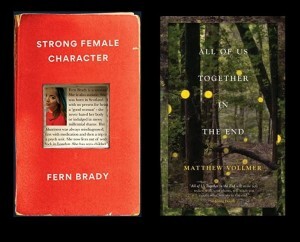
This category is going to be a tie, between one quite high-profile memoir that a lot of people will have read, and one that’s much more niche but meant a lot to me. Scots comedian Fern Brady’s Strong Female Character is a funny but also searing look at growing up autistic without knowing you’re autistic, and trying to find a place in the world. And Matthew Vollmer’s All of Us Together in the End is a quiet, thoughtful (and also sometimes very funny) examination of family, grief, faith and the loss of faith, that I still find hard to recommend to people because I start to cry every time I try to say the title out loud.
BEST NON-FICTION (other than memoir)

This one has to go to the hilarious and informative Unruly, David Mitchell’s irreverent look at the first several hundred years of English monarchs. As a bonus, this one and the Fern Brady memoir mentioned above also tie for “best audiobook,” as both are read by the authors, who are professional comedians and deliver wonderful performances.
BEST HISTORICAL FICTION
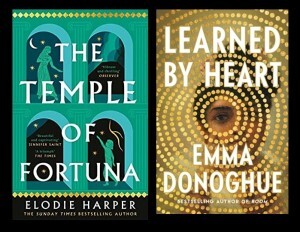
Always hard to narrow down the best of the best in my favourite category, but the standout for me this year was The Temple of Fortuna by Elodie Harper, the much-anticipated final volume of her Wolf Den trilogy, some of my favourite historical fiction of recent years. A close second is Emma Donoghue’s doomed lesbian coming-of-age love story, Learned by Heart. I also have to hand out a few honourable mentions in this category, to The Fraud by Zadie Smith, House of Odysseus by Claire North, and Newfoundland writer William Ping’s debut novel Hollow Bamboo.
BEST MYSTERIES

I’ve read a fair few mysteries this year, including starting the Louise Penney “Inspector Gamache” books that almost everyone I know seems to love, but that fell into the “just OK” category for me. Neither of my favourite mystery-type books were part of a series or even traditional genre-mysteries, though both had at their core the act of unravelling decades-old “cold case” murders of teenagers. Rebecca Makkai’s I Have Some Questions for You is a novel not just about solving a decades-old cold case, but also about the ethics of “true crime,” and the messiness that gets revealed when anyone begins probing into long-past mysteries. Tana French’s The Witch Elm is a genuinely creepy psychological study of a privileged man whose lucky life is falling apart around him, but it’s the discovery of a long-dead body on the family property that really kicks off his downward spiral. I’d give honourable mentions in this category to Richard Osman’s The Last Devil to Die and Benjamin Stevenson’s Everyone in My Family Has Killed Someone, both of which kept me turning pages, but neither of them had me emotionally riveted the way I Have Some Questions for You or The Witch Elm did.
BEST FANTASY (new)
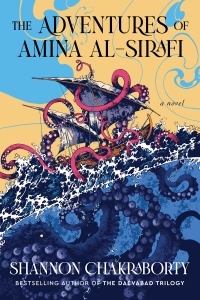
There’s no contest and no need to share the honours in this category. The best new fantasy I read this year, by a large margin, was Shannon Chakraborty’s The Adventures of Amina Al-Sirafi. It’s set in the same part of the world as her Daevabad trilogy, and includes some of the same Islamic/Middle Eastern mythology (yes there are djinn; yes there is a hot djinn, did you doubt there would be?) as that series, although in a different time period, but the story is very different, focusing on a woman pirate who’s been forced into retirement before being forced back onto the seas. Amina is a great character, the world of the story is brilliant, and I can’t wait to read more.
BEST FANTASY (old)
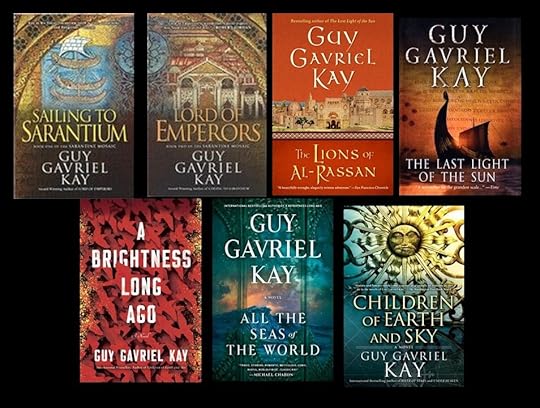
This summer I took a deep dive into re-reading a favourite series of books that was never constructed as a series. Guy Gavriel Kay has long been, and remains, my favourite author of fantasy. He’s written several books, beginning with The Lions of Al-Rassan in 1995 (probably my all-time favourite Kay novel), that are set in a world that is a very close, but not exact, analogue of Europe, North Africa and western Asia. (For one thing, this world has two moons, a blue one and a white one). Later books set in this same world explore different time periods and different countries similar to Spain, Italy, Greece, Turkey and other nations in our own world, often drawing on real historical characters but giving them elements of magic and mythology (as well as, sometimes, very different fates from their real-world counterparts).
Seeing how this world unfolds throughout these books as Kay adds more layers and more complexity to the world is fascinating. I read the books, not in publication order but in the order the stories occurred in that world’s chronology; it was jarring to realize, for example, that the shining city of Sarantium, that world’s version of Byzantium, which is so central to the other (chronologically earlier) books in the series, does not appear at all in The Lions of Al-Rassan, because Kay presumably hadn’t thought of writing about it yet.
There are tiny common threads throughout the books — a work of art created by an artist in one book is seen centuries later by a character in another; a beloved character from one story is commemorated in a statue at the end of a street that a character in another book walks past. Throughout, these little callbacks remind the reader that one of the ongoing themes of these novels is how we, as humans, leave our mark — whether as artists, as rulers, as warriors: characters are often obsessed with how, or if, they will be remembered by history, and reading the whole collection reminds us that there’s no guarantee, in the end, that even the most famous of us will be remembered, except perhaps as a distant and distorted echo of the past. Revisiting these books was a wonderful journey.
I could go on and on with this blog post, nominating some favourite romances, science fiction, contemporary fiction … but I think I’m good with this list for now, as these were the real stand-outs for me this year. All my reviews are here on the blog, so you can scroll back from this post and see some other things I’ve read this year and what I thought about them, or get a quick visual overview of my reading year here on my Pinterest board.
December 30, 2023
Beach Read, by Emily Henry
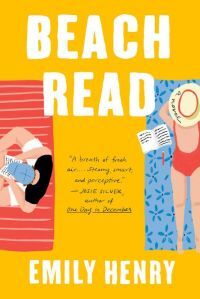
I’ve now read three Emily Henry romances this year; loved two and found one just “okay.” Beach Read was in the “loved” category. I really enjoy books that take the classic romance formula and do something fresh, fun, and not completely predictable with it.
In Beach Read, we know from the get-go that January and Augustus — two successful authors in very different genres who wind up living in beach houses next door to each other for a summer — are the classic romance pairing. She writes light, fun women’s fiction with happy endings because she believes in happy endings; he writes dark, serious literary fiction because he believes the world is a dark and complicated place. But a few events in January’s own life have caused her to question her own belief in happy endings, and January’s own growth as a person and a writer runs parallel to the ups and downs of her relationship with her neighbour. There’s as much fun here in the arguments about what makes good fiction and the snobbishness of the literary world, as there is in the progress of this romance — but you can count on a happy ending!
All Systems Red, by Martha Wells
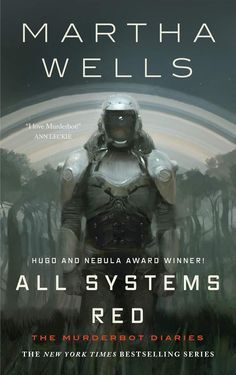
My husband and I sometimes like the same books in the genres we share (usually sci-fi, fantasy, and mystery) and sometimes, we just don’t. A book that really grabs one of us will fail to engage the other, and that’s OK, because reading is subjective. He really loved Martha Wells’ series The Murderbot Diaries, and after he recommended them, I mentally filed them under, “Sounds interesting, will check out when I get a chance” but hadn’t gotten around to reading them. Then I heard a few more people add their recommendation that this was a really great sci-fi series, so I gave it a shot and I’m glad I did.
All Systems Red is told from the perspective of an AI robot that calls itself Murderbot, in a futuristic world with lots of space travel and space capitalism. Murderbot is technically not a murderbot, it’s a security robot, but it has managed to hack its own internal systems so that it no longer has to follow orders. Essentially, it’s a robot with free will, and all the complexities that entails. When you no longer have to do the thing you were created and designed to do, what do you choose to do instead?
Murderbot handles these weighty philosophical questions with a wry humour that is, in some ways, recognizably human (a lot of the times, its answer to “what do you choose to do instead?” is just “be left alone to watch TV,” which, OK, we get that). But we never forget that Murderbot isn’t actually human, even though it may look a bit human, and its analytical gaze at human beings and their actions/reactions is believably “other.”
There are several books in this series and the first two, at least (which are all I’ve read so far) are quite short, almost more like novellas, so it’s quite easy to zip through one and on to the next!
If We Caught Fire, by Beth Ryan
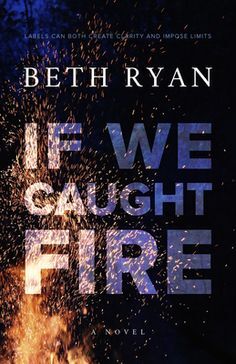
Beth Ryan’s If We Caught Fire is a thoughtful exploration of a complex family dynamic. Edie is a young adult whose parents divorced when she was younger. Although Edie continued to live with her mother, her father and stepmother (with whom her father was having an affair while still married to her mother) remain a part of her life, and she is close to her younger stepbrother. Then, when Edie is grown up and finished university, working in a veterinary clinic as she tries to decide what to do next with her life, her mother gets married again, to a man she met online. Edie’s new stepfather moves to Newfoundland, and for their wedding, her mother impulsively decides to invite Harlow, the new husband’s partially-estranged son. (It’s a lot to keep track of it, but it’s easier in the book, I promise).
Edie and Harlow quickly become friends as Harlow lingers in St. John’s after his father’s wedding. They are opposites in many ways: Edie is guarded, cautious, and reserved, while the expansive, outgoing Harlow is a risk-taker who makes connections with everyone he meets. The friendship between the two new step-siblings seems like it might be turning into romance — but things aren’t that simple, as Harlow’s brilliant exterior hides a darker side.
This is a quiet and introspective novel, a coming-of-age story in which Edie reflects back on the forces that shaped the person she is and questions who she might be in the future, while navigating a relationship with a man who seems designed to be a foil for all her own personality traits — but who is, of course, a person with his own complicated story and needs. There’s no definitive resolution at the end of this novel, but we are invited to journey with Edie through the twists and turns of an unpredictable summer. As well as a portrait of young adulthood, this novel also provides a well-evoked picture of contemporary St. John’s life among artsy young people. It felt absolutely real and believable.
And Then She Fell, by Alicia Elliott
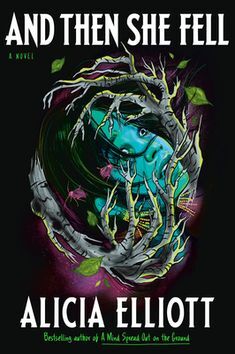
And Then She Fell is exactly what you would hope for an expect in a first novel from the author of the unforgettable memoir A Mind Spread Out on the Ground. The main character, Alice, is a young Mohawk woman married to a white university prof, Steve. From a background with some significant poverty and loss — although also one with a lot of family and community love and connection — Alice knows she is supposed to feel she has “arrived.” She’s married to a man who loves her, has financial security, is launching a career as a writer, and has just had her first child. But she’s also mired in post-partum depression that leaves her unable to feel she can love her baby, and is grieving the recent death of her mother. She feels out of place among her white suburban neighbours and among her husband’s university colleagues, unsure where she belongs.
Thus far, a pretty straightforward piece of contemporary realistic fiction. But when Alice’s inner doubts and fears begin to tip over into paranoia and hallucinations, the story shifts into something closer to the border between magic realism and horror. Like Alice herself, the reader begins questioning how much of what she sees, hears, thinks and feels is “real” and how much is delusion. Even when it’s clear that she’s having paranoid delusions, we’re reminded that the racist microaggressions that triggered her paranoia — like a neighbour accusing Alice of breaking into her own house when she locks herself out, on the assumption that an Indigenous woman can’t possibly live in their neighbourhood — are very much a part of real life.
By the time we get to the end of the book, we’re far from the realism that began the story, in an ending that depends on Alice’s time-travelling descendent going back in time to help Alice resolve the problems and choices she faces. I’ve seen this book called “surreal” and “haunting” and I would agree with both those adjectives. It’s powerful, arresting, and probably different from anything else you’ve read this year. Highly recommended.
December 28, 2023
Spare, by Prince Harry
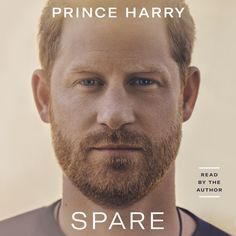
It certainly was interesting to go from my last audiobook — David Mitchell’s Unruly, a comic look at the lives and (mostly) failures of early English monarchs — to the next thing I listened to. Pretty much everyone knows that Prince Harry’s memoir is a controversial look into some dusty corners of the current English royal family, through the eyes of a member of The Firm who consciously chose to take a step back from active involvement in the business of being royal (though he is still “Prince Harry,” of course, and shows up for family events such as his grandmother’s funeral and his father’s coronation).
I feel about the royals pretty much the way I feel about baseball: ie, I understand that people care about it, though I don’t personally, and I don’t think my life would be materially different in any way if it ceased to exist. If forced at gunpoint to declare a preference in major league baseball, I’d probably say I’d rather the Blue Jays won the pennant than any other team, as they are based in Canada (though I did somewhat cheer for the Chicago Cubs there a few years ago, because I also always love a historic underdog). Most of the time, though, the existence of baseball, like that of the monarchy, has no impact on my own existence.
However, if forced to choose a side in the current Wars of the House of Windsor, I would (not even at gunpoint) say I’m Team Harry and Meghan — not uncritical supporters of theirs, by any means, but generally likely to agree that they’ve been hard done by at the hands of a ridiculous institution, some unpleasant family members, and the truly loathsome British press and paparazzi (who are, Prince Harry makes it quite clear, the real villains of his story).
I don’t know if there’s any reader so trusting and uncritical that they would read a memoir by a member of a deeply divided family and assume that everything they’re reading is objectively true. Clearly, this is Harry’s story, and he tells it the way he remembers and experienced it. For every confrontation or misunderstanding with his father, now-King Charles, or his brother William, Prince of Wales, I always thought, “Well, I’m sure Charles or William would tell quite a different version of that encounter!”
But overall, Harry’s story is compelling and believable (and reasonably well-written, for a celeb memoir — clearly this is due to the hard work of his ghostwriter, as Harry makes it quite clear throughout that reading books, never mind writing them, is not exactly his thing). I found it easy to empathize with a boy who suffered the tragic loss of his mother at age 12 and never really came to terms with it, while growing up in a family and an environment that was not really conducive to ever learning to cope with grief in a healthy way.
Of course, this is also the story of someone with a staggering amount of privilege — something Harry seems to grasp faintly, although I don’t think he ever displays any real understanding of how huge the gap between his life and the lives of most non-wealthy people is. After all, lots of people struggle with losing a parent, having the remaining parent be emotionally unavailable, not liking their step-parent, being considered dumb in school, having a relationship of mingled closeness and rivalry with their sibling, wanting but being unable to find true love as a young adult, and struggling to establish themselves in a meaningful career. (Fewer people struggle with all those things plus a frost-bitten penis, which we learn way too much about after Harry joins a polar expedition, but hey, we all have our little physical problems, living in human bodies as we do). Harry doesn’t seem to spend much time (at least in the book; I can’t speak for what goes on in his head) reflecting on the fact that most ordinary people who face these challenges have to deal with them while also working forty or more hours a week to try to afford exotic things like groceries, or rent, or going to the dentist. Harry writes about young-adult milestones like his career in the military and going grocery-shopping, but doesn’t spend any page time on the fact that for him, there’s no causal connection between these two things, and that puts him in a very rarified stratum of society.
All that being said — yes, he could be more aware of how much privilege his family’s wealth and position give him — but I’m not in the category of those who think that his problems don’t matter because he’s rich and royal. Losing your mom when you’re twelve sucks just as much if your mom is the most beautiful and idolized woman in the world, as it does if she’s an anonymous office clerk in an insurance company. There are a lot of things that wealth and privilege can shield you from, and then there are things — like loss, and grief, and loneliness — that hit people in the same way no matter what their income or family name.
Arguably, there’s one aspect of life that is worse for the royal family than for anyone else, and that’s the constant, often malicious, attention of The Press. This is tough for celebrities generally – Taylor Swift, I understand, has difficulty meeting up with a friend for lunch without the restaurant getting mobbed by photographers — but relatively few people in any society are subjected to the relentless glare of publicity as much as the key members of the British royal family are. That press coverage is often hostile, inaccurate, and involves such dogged invasions of privacy that it’s absolutely credible to say that Harry’s mother Diana was hounded to death by photographers. While there are lot of everyday troubles that Harry obviously can’t identify with, like choosing whether to put gas in your car or pay the electric bill for your apartment, I’m willing to concede that he also does have some troubles the rest of us can’t relate to.
While I don’t think Harry’s version of every royal squabble is the only accurate version — like every family, much is open to interpretation — I do think he is a man trying to do the right thing, who genuinely adores his wife and kids, and probably did the right thing by walking as far away as is possible from the weird family dynamics and the hostile press coverage associated with the House of Windsor. This wasn’t the best book or even the best memoir I’ve read this year by any means, but I am glad I listened to it.
Unruly, by David Mitchell

If there were ever a book that was lab-grown to meet all my requirements for a good non-fiction book, Unruly by David Mitchell is that book. One of my favourite English comedians, famous for his rants on a wide variety of topics, dives into my favourite subject — history with a review of English monarchs beginning well before William the Conqueror (he goes back to the Saxon kings) and ending with Elizabeth I. There’s plenty of actual history, interwoven with comedy, digressions and tangents, and of course a good few rants as well as some genuine insights into the nature of monarchy, leadership, and nationhood. And, bonus — I got the audiobook so I could have David Mitchell read it to me, which, if you like David Mitchell, is definitely the way to go.
I genuinely LOL’d several times while reading this, as well as learning a few things about some kings I didn’t know much about, particularly the early ones. I also enjoyed Mitchell’s rants and reflections. He is neither pro- nor anti-monarchy, seeing both the strengths and weaknesses of the institution, but the point of the book is not really to argue for or against the idea of having kings and queens — it’s to tell their stories with a strong bias towards the absurdity of their lives and the things that happened to them.
I was shocked to get near the end of the book and realize he was only covering English monarchs up to the end of the Tudor period. His reasoning for this is that after the time of Elizabeth I, the role of the monarch began the changes that would inevitably lead to the entirely ceremonial role that English monarchs play today, thus leading to lives that are perhaps less interesting to focus on, since their actions have far less impact on history. I can see the sense of this argument (though to be fair, if that’s the criteria I think he should have gone at least as far as Charles I before stopping, since his execution marks the most obvious break between absolute and constitutional monarchy, even if that transition was somewhat of a gradual process that began earlier and ended much later).
Despite understanding this reasoning, I wanted the book to go on and on and on making me laugh out loud, so I hope David Mitchell, against all odds, writes Unruly, Part 2. I want his take on the English Civil War and Restoration, and on the German Georges, and the Prince Regent, and Edward VIII’s abdication — the whole bit. Bring it on!
A Darker Shade of Magic, by V.E. Schwab
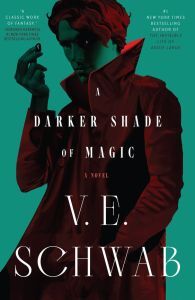
This was an engaging YA fantasy set partly in late Victorian (or possibly Edwardian) London, and partly in two parallel Londons, each ruled by different kinds of magic. The main character, Kell, comes from “Red London,” the more stable of the two magical kingdoms, but is one of the few people with the ability to move between worlds. In “Grey London” (that is, the London in our world) he meets a young thief called Lila Bard, and their fates become intertwined as they try to head off a magical disaster that has its origin in the violent and unstable “White London” but threatens all the realms.
I found this enjoyable and engaging while i was reading it. It’s the first of a trilogy, and while I wasn’t so compelled that I had to immediately pick up the next book to find out what happens, I very likely will go ahead and read the whole series.
November 26, 2023
The House of Eve, by Sadeqa Johnson
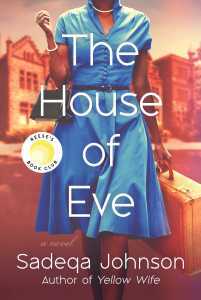
Much like Johnson’s first novel, Yellow Wife, The House of Eve (one of whose characters turns out to be descended from Pheby in Yellow Wife explores aspects of Black women’s history in the US that may not be widely known. This novel starts in 1948 with two young women, fifteen-year-old Ruby, a bright, ambitious high school student from a poor family in Philadephia, and Eleanor, a college sophomore pursuing her dreams at Howard University. The two girls have ambition and intelligence in common, but have never met, though their lives are destined to intersect in a way neither of them could predict.
While following the stories of both these young women I learned about classism and colorism within Black communities in this period, about the attitudes towards interracial relationships (of course, I always knew they disapproved of and for a long time illegal, but the attitude that a Black mother might have towards her daughter dating a white boy was explored here in ways I hadn’t thought of), and about the options for women who got pregnant of out wedlock in that era. As with Johnson’s last book, I found this an engaging and enlightening glimpse into a time, a place, and a community.
The Temple of Fortuna, by Elodie Harper
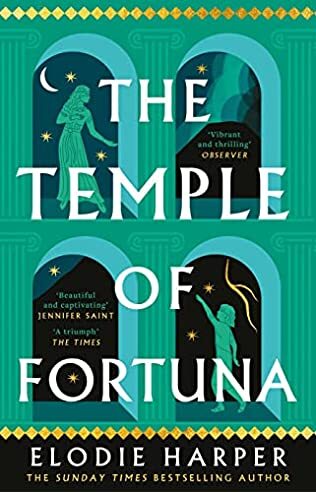
Most of the rave reviews I have for Elodie Harper’s Wolf Den trilogy have been covered in my posts on the first two books, The Wolf Den and The House With the Golden Door. This series about the lives of slaves and sex workers in ancient Pompeii is absolutely brilliant and engrossing; Amara was a character I could cheer for from the very first page of the series to the last; the whole series managed that tricky historical-fiction balance of making the past seem at once fresh and immediate and relatable, while at the same time starkly different from our time, with values so different we struggle to understand them. I’ve been waiting eagerly to see how the whole story would be resolved in this third volume, and absolutely nothing about it disappointed me – the ending was perfect.
With all that said, and the points I’ve made in the last two posts on these books, I wanted to talk a bit about one aspect of this novel that particularly interested me: the obliteration of Pompeii when Vesuvius erupted, and how that’s handled narratively in this novel.
If you pick up a novel set, as The Wolf Den is, in the 70s CE in Pompeii, and you know it’s the first of a series, you can be pretty confident from page one that sometime before the end of the series, likely near the end of Book 3, that volcano is going to erupt. History itself provides the foreshadowing, and there’s not a huge amount of extra foreshadowing added by the author in the first two books: occasional earth tremors, which the citizens of Pompeii dismiss as “just how things are around here.” These become more frequent and troubling when Amara returns to Pompeii from Rome in book 3, and readers know from the date that the volcano is about to blow. But the characters don’t know that, and Harper does a great job of keeping the foreshadowing light, illustrating how huge, world-changing events arrive with very little notice, and life often continues as normal right up to the exact second when it can’t anymore.
The eruption could be seen as a kind of deus ex machina in the novel: certain problems that have plagued Amara since The Wolf Den are going to become much less serious, if not eliminated altogether as a threat, once the entire city is buried under a layer of ash. Instead, readers’ concern shifts to whether Amara herself can survive and escape the disaster, and which, if any, of the people she loves might survive with her. The scenes in the immediate aftermath of the eruption brilliantly capture not only the physical experience but the desperation of suddenly becoming refugees, the pain of losing people, and the hope of going home to rebuild — which is dashed when the survivors realize what has actually happened to the city. There’s also a fascinating glimpse into the year after Vesuvius, and how the survivors who did manage to escape Pompeii built new lives for themselves in other places. A disaster that wipes out everything you own and have worked to build can also, sometimes, wipe out your past as well — and that might be just the ending your story needs.



